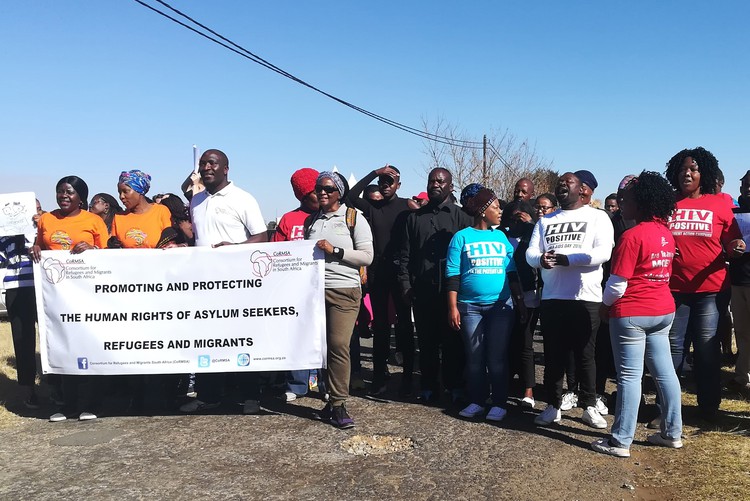Activists march to Lindela to demand better treatment of refugees
Malusi Gigaba says service at Desmond Tutu Refugee Reception Office has improved
Jean-Claude Kazaku, a trainer at Sonke Gender Justice and a refugee from the Democratic Republic of Congo, says asylum seekers often “lived in constant limbo”.
“You need that paper [refugee status] to rent a house, get a job or open a bank account so when you are constantly renewing temporary documentation for over 15 years, you can’t move forward in life,” he said.
Kazaku joined a group of about 80 activists from Lawyers for Human Rights (LHR), Right2Know, Sonke Gender Justice, African Diaspora Forum, Consortium for Refugee and Migrants in South Africa (CormSA), Treatment Action Campaign, Doctors without Borders and South African Federation of Trade Unions (SAFTU).
On Tuesday and Wednesday, the group picketed outside the Desmond Tutu Refugee Reception Office in Pretoria West and the Lindela Repatriation Centre in Krugersdorp respectively. They demanded better services for asylum seekers.
In a memorandum emailed to Mandla Madumisa, Director of Asylum Seeker Management at Home Affairs, the organisations demanded that the Port Elizabeth (PE) and Cape Town Refugee Reception Offices (RRO) be reopened. They also asked that the Department address the backlog in appeal processes and that the South African Human Rights Commission ensure that refugees’ rights are respected.
“Asylum seekers who arrived after the closure had to apply at the remaining RROs — Durban, Musina and Pretoria — and then return to the RRO of application for any further administrationof their claims, including permit renewals. The practical reality is that many have to
travel very far distances (up to 2,000km) every one to six months to renew their permits,” read the memorandum.
In 2011 and 2012, Home Affairs closed the Cape Town and PE RROs for new asylum applications. This meant it would only operate for asylum seekers who lodged claims before the closures. The Supreme Court of Appeal declared the closures unlawful and ordered that the centres be reopened.
The Port Elizabeth RRO will open in July while the Cape Town centre remains closed.
“This is costly, both financially and emotionally, and places heavy burdens on families, and makes asylum-seekers vulnerable to abuse, sexual violence and extortion,” it stated.
On Wednesday, Minister of Home Affairs Malusi Gigaba attended an event for World Refugee Day at Constitutional Hill in Johannesburg. Gigaba said South Africa has hosted over 126,000 recorded refugees since 2009, and “many more asylum seekers”.
He said economic migrants increased the number of illegitimate asylum seeker applications, making it difficult to “identify and respond to the needs of genuine refugees”.
Gigaba said new technology at reception offices was expected to improve the rate at which applications are processed as well as decrease the current backlog.
“The Desmond Tutu Refugee Reception Office in Pretoria was once notorious for long waiting times, client frustration and chaotic crowds which were a breeding ground for corruption and exploitation. Now, the implementation of an automated booking system with self-extension capability has completely transformed the office and alleviated huge frustration for asylum seekers,” he said.
Lawyers for Human Rights in a letter on Monday urged President Cyril Ramaphosa to make unannounced visits to the Refugee Reception Offices. The advocacy group said the three most common complaints from the detainees in Lindela were the lack of adequate nutrition, irregular or inadequate medical care and forced interruption of sleep.
“In general, the reports of ill-treatment point towards a pattern of routine, if not systemic, physical abuse perpetrated against the detainee population,” the letter read.
Support independent journalism
Donate using Payfast

Don't miss out on the latest news
We respect your privacy, and promise we won't spam you.
Next: Judgment paints a damning picture of prison life at Sun City
Previous: Understanding the Constitutional Court’s Sidney Frankel judgment
© 2018 GroundUp.
This article is licensed under a Creative Commons Attribution-NoDerivatives 4.0 International License.
You may republish this article, so long as you credit the authors and GroundUp, and do not change the text. Please include a link back to the original article.

